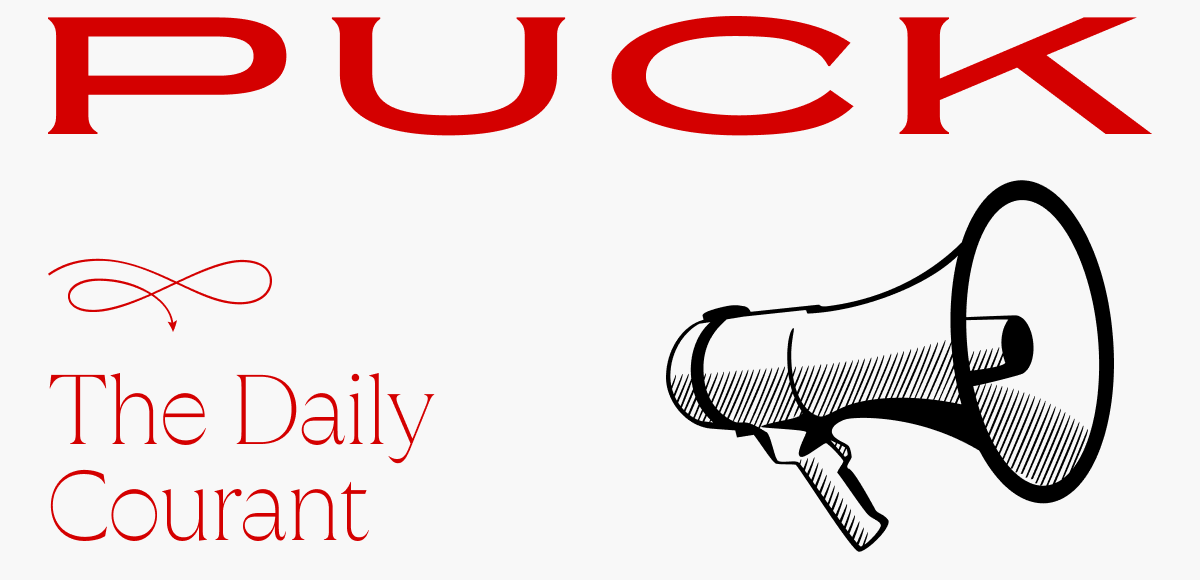
|
PREVIEW VERSION
|
|
|
|
Signalgate Scrambled, Paltrow’s Press Games, Art Market Arbitrage
|
Welcome back to The Daily Courant, your afternoon dispatch of Puck’s best new reporting.
Today, we lead with Bill Cohan’s sobering account of how major Wall Street executives are processing President Trump’s attacks on some of the industry’s most respected law firms—Perkins Coie, Covington & Burling, Jenner & Block—and especially the assault on Paul Weiss, which forced its chairman, Brad Karp, to offer tribute to the White House.
Some say Karp did what was necessary to save his firm. Others worry that once Trump is done throwing darts at Big Law, he’ll turn to banks and private equity.
Plus, below the fold: Leigh Ann Caldwell digs into the administration’s increasingly tortured defense of Signalgate. Dylan Byers examines Mark Thompson’s latest hires for clues about CNN’s still-perplexing digital strategy. Rachel Strugatz
reveals what’s actually been going on at Gwyneth Paltrow’s Goop since last year’s layoffs. And exclusively for Inner Circle members, Marion Maneker deciphers the complex market structure (and arbitrage opportunities) surrounding the captivating Italian artist Alighiero Boetti. Meanwhile, on The Powers That Be, Leigh Ann and Peter Hamby offer fresh perspectives on D.C.’s scandal of the week.
|
|
|

|
William D. Cohan
|
|
In response to Trump’s Orwellian executive order on March 14 targeting Paul Weiss, chairman Brad Karp agreed that his
firm would donate $40 million in pro bono legal work to Trump administration priorities. The concession drew vociferous criticism from many in his peer set, but behind closed doors, executives across Wall Street are much more sympathetic. “If he doesn’t settle, the firm goes down,” one Wall Street C.E.O. told Bill. “A lot of companies would just avoid the firm. They’d say, Why do we need this? Why do we need to hire Paul Weiss? We’re doing a deal. Why do I want Paul Weiss to do my
antitrust?” But senior finance executives are also worried that the administration, warming to the task of bringing major institutions to heel, could soon aim executive orders at a SIFI—a Systemically Important Financial Institution. At that point, they say, all bets are off.
Read Now
|
|
|

|
Leigh Ann Caldwell
|
|
As with pretty much everything in Trump 2.0, most Republicans are publicly standing by the administration over the
Signal group chat scandal. But while most are following Trump’s standard deny-dismiss-excuse-deflect playbook, a faction of national security–type Hill Republicans are privately expressing discomfort with the episode. All of this has placed Republicans in an awkward spot, to put it mildly, given that they’ve spent much of the past decade attacking Democrats for intelligence breaches and failures. “It used to be where people who had positions of high public responsibility, when you
screwed up, the captain went down with the ship, apologized. There was a certain respect for that,” one Republican senator told Leigh Ann. “We’ve lost all that.”
Read Now
|
|
|

|
Dylan Byers
|
|
This week, CNN chief Mark Thompson took another step toward the network’s long-awaited digital transformation,
appointing Wall Street Journal video chief Amanda Wills as chief content officer. Wills, a CNN veteran, previously served as V.P. of content programming for the ill-fated CNN+ and executive producer of breaking news for CNN Digital. Thompson also rehired Nancy Han as S.V.P. of video editorial, further stacking CNN’s digital ranks with key figures from the defunct streaming venture. But while it certainly looks like Thompson is getting the pre–Chris Licht band back
together, the network’s ambitions have changed considerably since the Zucker days.
Read Now
|
|
|

|
Rachel Strugatz
|
|
It seems like we’re at the beginning of a nine-month Gwyneth Paltrow publicity tour, one that will culminate
with the Christmas Day release of Marty Supreme, her first leading role in 15 years. Paltrow’s return to the stage is also a natural segue for the next iteration of Goop, which Paltrow has been trying to reinvent forever, and whose investor base has been patiently waiting for years for an exit. As Rachel writes, despite Paltrow’s insistence that Goop’s business is “healthy,” and the company’s recitation of year-over-year and year-to-date rates of
growth, Goop still isn’t profitable some 17 years after its inception. Are partnerships with big wholesalers the answer?
Read Now
|
|
|

|
Marion Maneker
|
|
At first glance, there may be nothing extraordinary about Ben Brown opening a new show of
Alighiero Boetti’s Aerei—the templated images of various airplanes, often tinted with watercolors or hand-colored with ballpoint pen. But the show plays a meaningful role in the market structure for Boetti, an artist with numerous discrete bodies of work within his broader practice. The artist’s auction sales were at $30 million in 2014 before declining and bottoming out in 2020. Then, sales rebounded—nearly $25 million in 2021, $31 million in 2022. After auction volume took a breather
in 2023, sales climbed back to $24.75 million last year. Could the resurgence signal a new peak, or is the market merely catching its breath?
Read Now
|
|
|

|
Peter Hamby
|

|
Leigh Ann Caldwell
|
|
Leigh Ann Caldwell joins Peter for an inside look at D.C.’s remarkable Signal group chat scandal, in which senior
national security officials from the Trump administration accidentally added The Atlantic’s Jeffrey Goldberg to a private group chat discussing war plans. Leigh Ann digs into the G.O.P.’s response—from those doubling down on Trump-style deflection, to those sounding the alarm on the grave national security risk.
Listen Now
|
|
|
Need help? Review our FAQ page or contact us for assistance. For brand partnerships, email ads@puck.news.
You received this email because you signed up to receive emails from Puck, or as part of your Puck account associated with . To stop receiving this newsletter and/or manage all your email preferences, click here.
|
Puck is published by Heat Media LLC. 107 Greenwich St, New York, NY 10006
|
|
|
|



_01JQC3TBRC7M6K2EF9F4TJW4N6.png)
_01JQC3TB1E71AE1JNWZN1RFTYJ.png)
_01JQC3TBEJ1GFSV0Y77JJ6F18K.png)
_01JQC3TC375C4F1T3X7BKY6PX7.png)


















